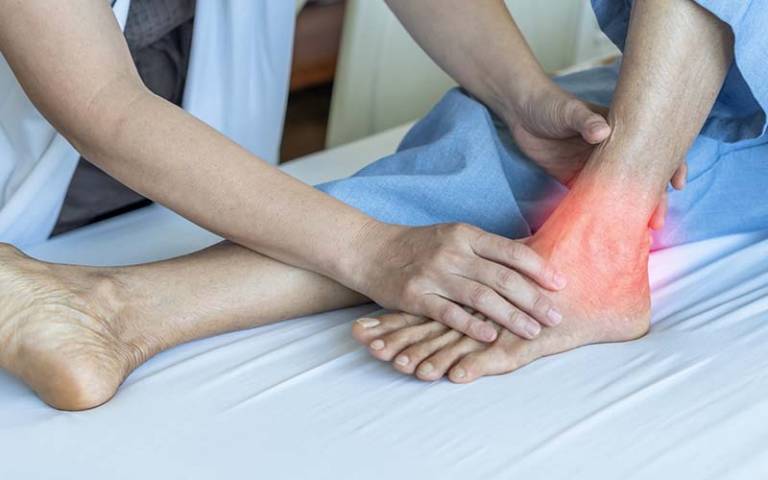Trial shows benefits of two forms of ankle surgery for osteoarthritis
15 November 2022
Patients with advanced ankle osteoarthritis who undergo surgery see equally good outcomes from the two main surgical treatments for the condition, a new study led by UCL researchers has shown.

The TARVA randomised clinical trial compared total ankle joint replacement with ankle fusion (when the ankle joint is pinned to prevent movement). It was led by the Comprehensive Clinical Trials Unit at UCL, and involved 17 NHS Trusts across the UK.
The new study, published in Annals of Internal Medicine, analysed the outcomes from just over 280 patients aged between 50 and 85, half of whom had total ankle replacement and half had ankle fusion surgery. Both procedures are intended to relieve pain and restore movement that was lost due to advanced osteoarthritis.
The outcomes were measured using standard assessments which covered quality of life, pain levels and ability to carry out daily activities – including, where relevant, participation in sport. Patients were assessed before their operation and twelve months after surgery.
The study found that both total ankle replacement and ankle fusion improved patients’ quality of life considerably, with overall no statistically significant differences between them. But when the ankle replacement type most used in the UK, a fixed bearing joint replacement, was looked at separately, it showed a significant improvement in clinical scores and quality of life over ankle fusion.
The study also found that total joint replacement saw better clinical outcomes than ankle fusion in patients with arthritis in surrounding joints. In ankle fusion, the shin bone is pinned to the talus, the uppermost bone in the foot. This prevents movement in the ankle joint, but movement is retained in the 30 other joints within the foot. All patients underwent an MRI scan before their operation, and 42% were found to have arthritis in surrounding joints, although many of them had no symptoms. Patients receiving joint replacement were found to have a better range of movement than those that underwent ankle fusion.
Andrew Goldberg (Honorary Associate Professor, UCL Surgery & Interventional Science), the consultant orthopaedic surgeon who led the trial, said: “The TARVA study shows how important it is to know the health of the surrounding joints before the patient undergoes surgery, which may involve an MRI, as it could help inform which procedure might be better for the patient.”
The research also highlighted some differences in complications following surgery between the two procedures. Patients undergoing total ankle replacement were more likely to see their wound take longer to heal than those having ankle fusion. Total ankle replacement was also more likely to result in some nerve damage than ankle fusion, leaving patients with numbness or tingling in the foot. Patients who underwent ankle fusion surgery were more likely to suffer blood clots in the legs – treatable through medication – as the procedure requires patients to be immobilised for longer than ankle replacement.
Mr Goldberg added: “Although the risks are not life threatening, understanding the different risks involved in each procedure is essential. Our aim in this trial was to provide the data that patients need to make informed decisions about these operations. We’ve clearly shown that both joint replacement and fusion provide significant patient benefits. We also found that the type of joint replacement seems to have an effect but this needs further research.”
Corresponding author of the study, Kashfia Chowdhury (Medical Statistician, Comprehensive Clinical Trials Unit at UCL), said: “This is the largest study of its kind to be completed in this field, providing robust findings thanks to the teams across the UK who contributed and ensured high data quality.”
The study was funded by the National Institute for Health and Care Research (NIHR).
Links
- Paper in Annals of Internal Medicine
- Andrew Goldberg’s academic profile
- UCL Surgery & Interventional Science
- UCL Medical Sciences
- Kashfia Chowdhury’s academic profile
- Comprehensive Clinical Trials Unit at UCL
- UCL Population Health Sciences
Image
- Credit: iStock
Media contact
Mark Greaves
T: +44 (0)7990 675947
E: m.greaves [at] ucl.ac.uk
 Close
Close

